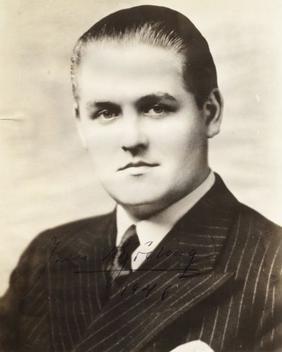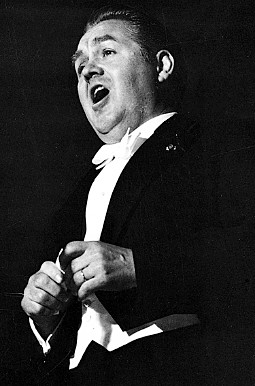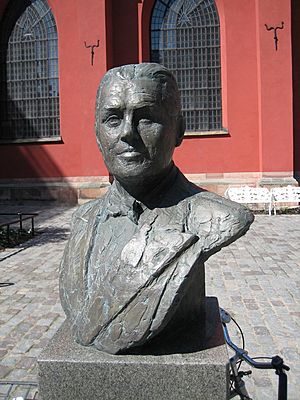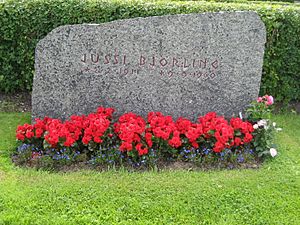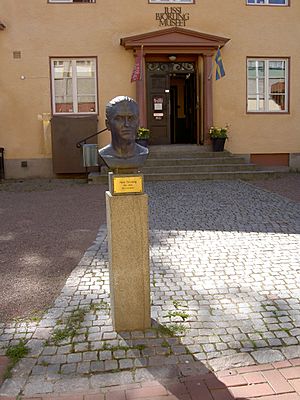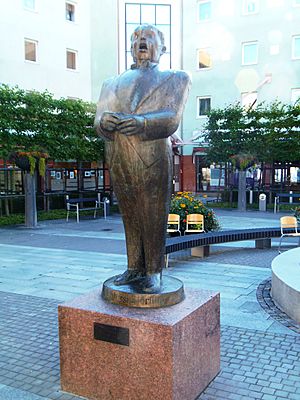Jussi Björling facts for kids
Johan Jonatan "Jussi" Björling (born February 5, 1911 – died September 9, 1960) was a famous Swedish tenor singer. He was one of the most important opera singers of the 20th century. Jussi Björling sang for many years at the Metropolitan Opera in New York City. He also performed at other major opera houses in Europe, like the Royal Opera House in London and La Scala in Milan. He was known for singing Italian, French, and Russian operas with great skill.
Contents
Early Life and Family
Jussi Björling was born in Stora Tuna, Borlänge, Sweden, in February 1911. His father, David, was also a talented singer. David taught Jussi and his two brothers, Olle and Gösta, how to sing. All three brothers became professional singers.
Jussi first performed in public when he was just five years old. He sang with his father and brothers in a group called the Björling Male Quartet. They performed concerts all over Sweden and the United States for over ten years.
After his father passed away in 1926, the quartet stopped performing. Jussi then worked as a lamp salesman for a short time. In 1928, he made his first appearance on the radio. That same year, he was accepted into the Opera School and the Royal Swedish Academy of Music.
Becoming an Opera Star
Jussi Björling first appeared on stage in a small role in the opera Manon Lescaut in July 1930. Soon after, he had his official debut as Don Ottavio in Mozart's Don Giovanni in August 1930. He quickly got a contract with the Royal Swedish Opera. By 1938, he had performed in 53 different opera roles! Some of his famous roles included Rodolfo in La bohème and Faust in Faust.
In 1931, Jussi Björling performed outside Sweden for the first time as an adult, singing in Copenhagen. He often gave concerts in parks and entertainment venues during the summer. In 1937, he made his first concert tour in America. He also performed in opera in Chicago that year.
On November 24, 1938, he made his big debut at the Metropolitan Opera in New York City. He sang the role of Rodolfo in La bohème. He continued to perform there regularly until 1941.
Working with Famous Conductors
In 1940, a very famous conductor named Arturo Toscanini invited Björling to sing in Beethoven's Missa solemnis in New York. They also performed the Verdi Requiem together. These performances were recorded, so we can still hear them today!
In 1939, Björling made his debut at the Royal Opera House in London. During World War II, he mostly performed in Europe. In 1944, the Swedish King, Gustaf V, gave him the special title of hovsångare, which means "court singer."
After the war, in 1945, Björling returned to the U.S. and often sang at the Metropolitan Opera. He performed many important tenor roles in French and Italian operas. These included Il trovatore, Rigoletto, Aida, and Tosca.
He also performed at La Scala in Italy in 1946 and 1951.
Final Performances
On March 15, 1960, Jussi Björling had a heart attack before a performance in London. But he still insisted on singing! He then went on a short tour in America. His very last opera performance was as Faust in San Francisco on April 1, 1960. His final concert was in Stockholm on August 20, 1960, exactly 30 years after his official debut.
Jussi Björling passed away on September 9, 1960, at the age of 49. He died from an enlarged heart.
His Recordings
Jussi Björling made many recordings during his career. In 1951, he recorded duets with another famous singer, Robert Merrill. One well-known recording was "Au fond du temple saint" from the opera Les pêcheurs de perles.
He recorded complete operas like Il trovatore in 1952 and Cavalleria rusticana and Pagliacci in 1953. He also recorded Manon Lescaut in 1954 and Aida in 1955.
One of his most admired recordings was La bohème with Victoria de los Ángeles, conducted by Sir Thomas Beecham. His recording of Madame Butterfly is also very famous.
In 1957, he sang the role of Mario Cavaradossi in the first complete stereo recording of Tosca. In 1959, he won a Grammy Award for his album Björling in Opera.
In 1956, he appeared on a TV show called Producers' Showcase. You can still find black-and-white versions of these performances on DVD.
One of his last recordings was the Verdi Requiem in June 1960, just a few months before he passed away.
Personal Life and Legacy
Jussi Björling was often called the "Swedish Caruso" because of his amazing voice. His son, Rolf, also became a tenor singer, and his grandson Raymond continues the family's singing tradition.
His wife, Anna-Lisa Björling, wrote a book about him. She described him as a loving family man and a kind person to work with. He is buried in the church cemetery in Stora Tuna, Sweden.
Remembering Jussi Björling
Many things have been created to remember Jussi Björling:
- The Gröna Lund Jussi Björling Award was started in 1963.
- The Jussi Björling Memorial Scholarship was created in 1970.
- The Jussi Björling Recital Hall was opened at Gustavus Adolphus College in Minnesota in 1970.
- A Jussi Björling Tenor Competition was held in Borlänge in 1994, with singers from all over the world.
- The Jussi Björling Museum opened in Borlänge in 1994.
- There is also a special Jussi Björling Music Scholarship at Gustavus Adolphus College.
- A large collection of his recordings, photos, and letters is kept at the Jacobs School of Music at Indiana University Bloomington.
Famous tenor Luciano Pavarotti once said in an interview: "When I'm about to learn a new opera, I first listen to how Jussi Björling did it. His voice was unique and it's his path that I want to follow. I would more than anything else wish that people compared me with Jussi Björling. That's how I'm striving to sing." This shows how much other great singers admired him.
Discography
Larger general collections on CD
- Jussi Björling: The Swedish Caruso, EMI Classics 2 17313 2 (5 CDs, 2008)
- Jussi Björling: The Complete RCA Album Collection, RCA 88697748922 (14 CDs, 2011)
- The Very Best of Jussi Björling, EMI Classics 6 78997 2 (2 CDs, 2012)
- Jussi Björling Collection, Naxos 8.101101 (11 CDs, 2012. Comprises studio recordings. CDs 1–8 earlier issued separately. Released in Sweden with notes in Swedish only.)
- Jussi Björling: The Swedish Caruso, Documents 600034 (10 CDs, 2013)
- Jussi Björling: The Worldstar Live on Stage, Documents 600129 (10 CDs, 2013)
A complete list of Björling's recordings and their CD and DVD issues is available on the Jussi Björling Museum's website.
See also
 In Spanish: Jussi Björling para niños
In Spanish: Jussi Björling para niños
 | John T. Biggers |
 | Thomas Blackshear |
 | Mark Bradford |
 | Beverly Buchanan |


